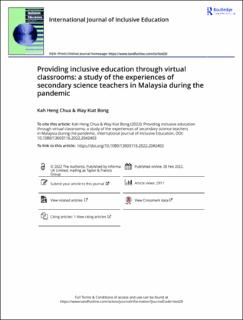| dc.contributor.author | Chua, Kah Heng | |
| dc.contributor.author | Bong, Way Kiat | |
| dc.date.accessioned | 2023-02-22T14:24:35Z | |
| dc.date.available | 2023-02-22T14:24:35Z | |
| dc.date.created | 2022-03-03T13:24:18Z | |
| dc.date.issued | 2022-02 | |
| dc.identifier.citation | International Journal of Inclusive Education. 2022, 1-18. | en_US |
| dc.identifier.issn | 1360-3116 | |
| dc.identifier.issn | 1464-5173 | |
| dc.identifier.uri | https://hdl.handle.net/11250/3053380 | |
| dc.description.abstract | During the COVID-19 pandemic, remote teaching was required to ensure that educators could continue teaching and that students could still attend classes. However, since the necessity for remote teaching occured, many teachers were not used to teaching virtually while ensuring that their students were given equal opportunities and environments to obtain a quality education. The aim of this study is therefore to explore the experiences of secondary school teachers in Malaysia in providing a more inclusive education during the pandemic specifically in science-related subjects via virtual classrooms. An online survey was conducted among 126 science teachers. The findings indicate that the readiness of science teachers in providing inclusive education is not high. Their scores in terms of affective attitude, behaviour, cognition, competence and awareness were barely sufficient. Issues such as lack of experience teaching virtually, insufficient training and support from schools and educational authorities, and parents lacking technological competence and skills to facilitate their children’s virtual classrooms at home were identified. This study has implications for researchers and educational institutions that intend to promote inclusive education in the context of remote teaching and learning. | en_US |
| dc.language.iso | eng | en_US |
| dc.publisher | Routledge | en_US |
| dc.relation.ispartofseries | International Journal of Inclusive Education; | |
| dc.relation.uri | https://doi.org/10.1080/13603116.2022.2042403 | |
| dc.rights | Attribution-NonCommercial-NoDerivatives 4.0 Internasjonal | * |
| dc.rights.uri | http://creativecommons.org/licenses/by-nc-nd/4.0/deed.no | * |
| dc.title | Providing inclusive education through virtual classrooms: a study of the experiences of secondary science teachers in Malaysia during the pandemic | en_US |
| dc.type | Peer reviewed | en_US |
| dc.type | Journal article | en_US |
| dc.description.version | publishedVersion | en_US |
| dc.rights.holder | © 2022 The Author(s) | en_US |
| cristin.ispublished | true | |
| cristin.fulltext | postprint | |
| cristin.qualitycode | 2 | |
| dc.identifier.doi | https://doi.org/10.1080/13603116.2022.2042403 | |
| dc.identifier.cristin | 2007361 | |
| dc.source.journal | International Journal of Inclusive Education | en_US |
| dc.source.pagenumber | 1-18 | en_US |

